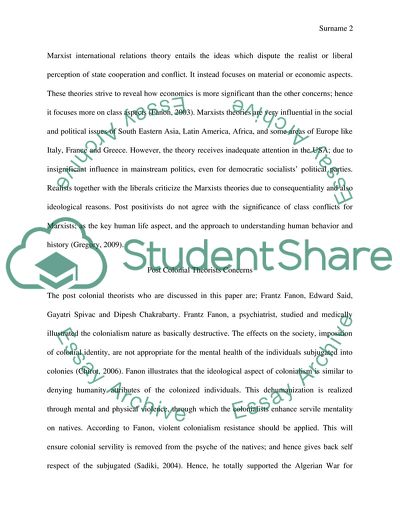Cite this document
(Postcolonial Theorists Concerns and Marxists Thinking on International Relations Essay Example | Topics and Well Written Essays - 1750 words, n.d.)
Postcolonial Theorists Concerns and Marxists Thinking on International Relations Essay Example | Topics and Well Written Essays - 1750 words. https://studentshare.org/philosophy/1836432-to-what-extent-do-the-concerns-of-postcolonialist-theorists-coincide-with-marxist-thinking-about-international-relations-where-do-they-differ
Postcolonial Theorists Concerns and Marxists Thinking on International Relations Essay Example | Topics and Well Written Essays - 1750 words. https://studentshare.org/philosophy/1836432-to-what-extent-do-the-concerns-of-postcolonialist-theorists-coincide-with-marxist-thinking-about-international-relations-where-do-they-differ
(Postcolonial Theorists Concerns and Marxists Thinking on International Relations Essay Example | Topics and Well Written Essays - 1750 Words)
Postcolonial Theorists Concerns and Marxists Thinking on International Relations Essay Example | Topics and Well Written Essays - 1750 Words. https://studentshare.org/philosophy/1836432-to-what-extent-do-the-concerns-of-postcolonialist-theorists-coincide-with-marxist-thinking-about-international-relations-where-do-they-differ.
Postcolonial Theorists Concerns and Marxists Thinking on International Relations Essay Example | Topics and Well Written Essays - 1750 Words. https://studentshare.org/philosophy/1836432-to-what-extent-do-the-concerns-of-postcolonialist-theorists-coincide-with-marxist-thinking-about-international-relations-where-do-they-differ.
“Postcolonial Theorists Concerns and Marxists Thinking on International Relations Essay Example | Topics and Well Written Essays - 1750 Words”. https://studentshare.org/philosophy/1836432-to-what-extent-do-the-concerns-of-postcolonialist-theorists-coincide-with-marxist-thinking-about-international-relations-where-do-they-differ.


